Despite the Covid-19 pandemic the industry is continuing to make investments, building new plants, upgrading existing cranes, seeing a rise in electric car sales and foreign companies expanding in Russia
- Kito ER2 lifts the driver’s cab precisely onto the truck frame on the assembly line
- Kito Erikkila jib crane with Kito EQ loads blanks into a press
- The OMi crane being installed at Toyotetsu Stamping Plant (TTTX) in Texas. (2)
- The OMi crane being installed at Toyotetsu Stamping Plant (TTTX) in Texas.
- Toyotetsu Stamping Plant (TTTX)
- Unified Industries Brand ProPath Automated Workstation Crane
The automotive industry was hit hard by Covid-19 and countries that were heavily impacted by the outbreak included China, which saw a disruption in spare parts exports; its Hubei province, the pandemic’s epicentre, is one of the country’s key automotive production centres. There were also large scale manufacturing interruptions across Europe, and the closure of assembly plants in the United States.
But not all is doom and gloom says Dan Beilfuss, director of sales Americas, Crane Solutions Group, Columbus McKinnon, which supplies Workstation and Jib Cranes, Ergonomic Lift Assists, Air Hoists, and automation technology such as its Magnetek-brand Intelli-Crane family of products to the industry, among others. “While the automotive sector was hit hard with the pandemic, like most sectors, they are continuing to make investments, but at a more conservative pace. Manufacturers continue to build new plants, upgrade existing cranes, and purchase new cranes despite these uncertain times, and are looking for ways to increase the safety of their operations,” he says.
He added, there is also a lot of investment in electric vehicle manufacturing, and we will continue to see growth in this area.
In fact, the electric vehicle market has witnessed a rapid evolution with ongoing developments in the automotive sector, dominated by globally established players such as Tesla (US), BYD (China), BMW (Germany), Volkswagen (Germany), and Nissan (Japan) and developed nations such as the US, Germany, and the UK are actively promoting the use of electric vehicles to reduce emissions, which has resulted in the growth of electric vehicle sales.
In a report by markets and markets research group, favourable government policies and support in terms of subsidies and grants, tax rebates and other nonfinancial benefits in the form of car pool lane access, new car registration (specifically in China where ICE engine new car registration is banned in some urban areas) the increasing vehicle range, better availability of charging infrastructure and proactive participation by automotive OEMs will drive global electric vehicle sales.
Renault announced this month it will launch 24 vehicles in the next five years and at least 10 electric vehicles, including a Renault 5 prototype, which is a compact electric car with a more stylish retro design than the current Renault Zoe EV, to go on sale before 2025.
“At Renault, we embrace the waves of disruption and create our own ‘Nouvelle Vague’. It’s about bringing modernity to the automotive industry. We’ll move to an energy brand, strengthening our EV leadership with the Electro Pole project and investing in Hydrogen, aiming at achieving the greenest mix in Europe by 2025,” says Luca de Meo, CEO, Groupe Renault.
According to Konecranes, another area of interest is that many foreign automotive companies have set up their businesses in Russia and they are now increasing production there, which allows them to optimise logistics chains and fully meet the demands of the local market.
Boston Consulting Group (BCG) a global management consulting firm, claims with more than $10bn committed to upgrading facilities and expanding capacity through 2020, the auto industry is the one industrial sector in Russia that is attracting serious levels of direct foreign investment, driven by the Russian government’s policy of supporting foreign investment in the auto sector. Such investment followed a “localisation through partnership” blueprint that encouraged global OEMs to invest in local production, source components locally, and form partnerships that support the modernisation of domestic OEMs.
Konecranes has been helping Toyota Motors increase production efficiency at its factory in St. Petersburg since 2007, supplying overhead cranes of 40 tons hoisting capacity to handle dies and molds.
“Our company is scrupulous about selection of suppliers. In this case we took into account the fact that our facility in St. Petersburg is close to Konecranes head office in Finland. Another strong argument when choosing a supplier was the well-developed Konecranes service able to ensure arrival of specialists within four hours if necessary,” says Leonid Kalinin, senior engineer, Toyota Motors.
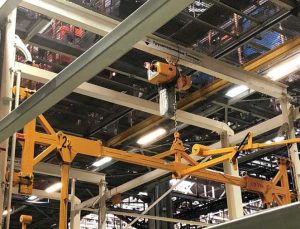
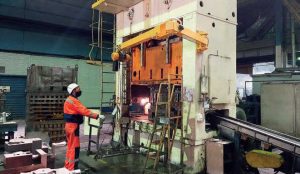
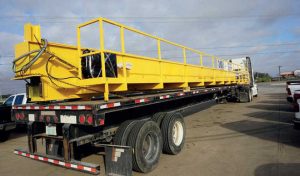
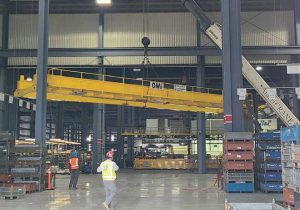
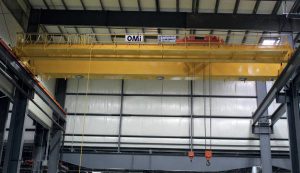
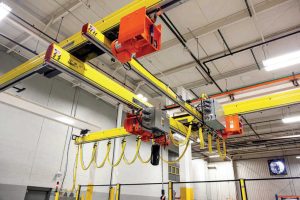
没有评论:
发表评论